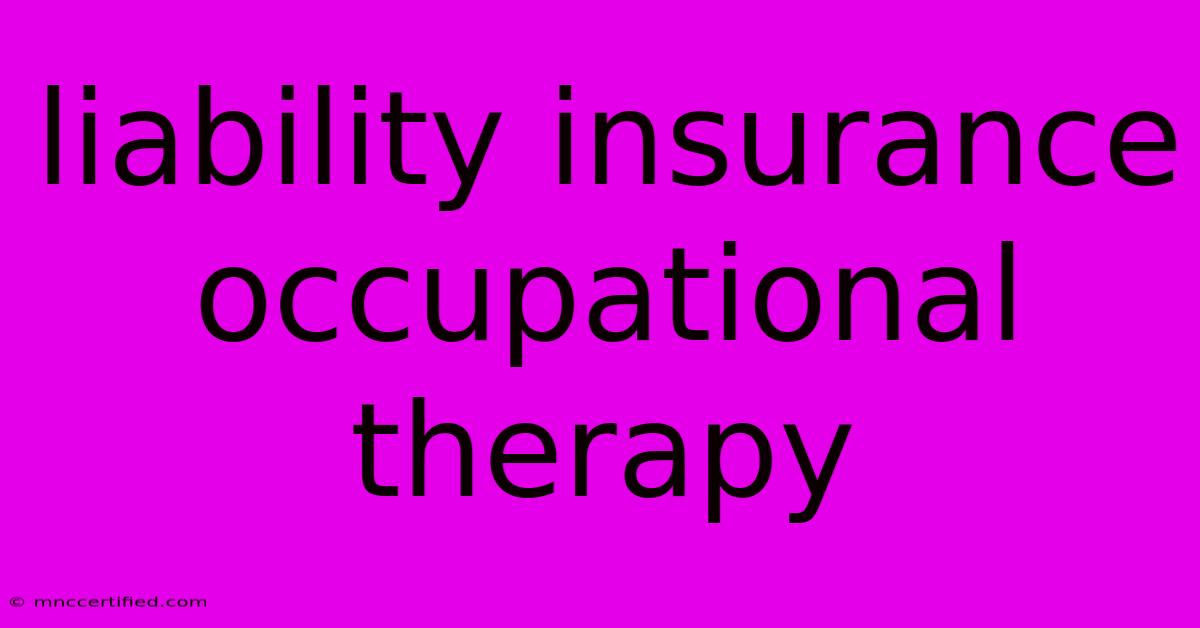Liability Insurance Occupational Therapy

Table of Contents
Protecting Your Practice: Why Liability Insurance is Essential for Occupational Therapists
Occupational therapists (OTs) play a vital role in helping individuals of all ages achieve their full potential. From assisting children with developmental delays to supporting adults recovering from injuries, OTs provide personalized care that improves quality of life. However, like any healthcare profession, OTs face inherent risks, making liability insurance a critical component of their practice.
Understanding Liability Risks in Occupational Therapy
OTs can face various legal and financial risks in their daily practice. These risks can stem from:
- Treatment errors: Misdiagnosis, inappropriate treatment plans, or mistakes during therapy sessions.
- Patient injuries: Accidental falls, equipment malfunctions, or unexpected reactions to treatment.
- Breach of confidentiality: Disclosure of sensitive patient information without consent.
- Negligence: Failure to provide appropriate care, resulting in harm to the patient.
The Importance of Liability Insurance for OTs
Liability insurance offers financial protection for OTs against claims of negligence or malpractice. This protection is essential for:
- Financial stability: A lawsuit can result in significant legal fees and potential financial settlements. Insurance helps to cover these costs, preventing you from facing personal bankruptcy.
- Peace of mind: Knowing you have adequate coverage allows you to focus on providing quality care without the constant worry of legal repercussions.
- Professional reputation: A malpractice claim can damage your reputation within the community, impacting referrals and future employment opportunities. Insurance can help you defend against false accusations and protect your professional image.
Types of Liability Insurance for Occupational Therapists
Several types of liability insurance are available for OTs, including:
- General liability insurance: Covers claims arising from property damage, bodily injury, and personal injury to third parties.
- Professional liability insurance (Malpractice insurance): Covers claims related to professional negligence or errors in treatment.
- Errors and omissions insurance: Provides coverage for mistakes or omissions in your professional services, such as failing to provide adequate documentation.
- Cyber liability insurance: Protects your practice against data breaches and other cyber threats that can lead to financial losses.
Choosing the Right Liability Insurance for Your Practice
The type and amount of insurance coverage you need will depend on several factors, including:
- Your practice setting: The risk profile varies for private practices, clinics, and hospitals.
- The services you provide: Specializations like hand therapy or mental health can come with specific liability considerations.
- Your state's regulations: Some states require minimum liability insurance coverage for OTs.
- Your budget: Ensure you can afford the premiums while maintaining a comfortable financial cushion for your practice.
Finding and Comparing Quotes
- Talk to an insurance broker: They can help you understand the different types of coverage available and advise on the most suitable options for your practice.
- Get multiple quotes: Compare prices and coverage from different insurance providers to find the best value for your needs.
- Read the policy carefully: Ensure you understand the coverage limits, exclusions, and other conditions before purchasing a policy.
Maintaining Your Coverage
- Review your policy regularly: Your practice needs may change over time, requiring adjustments to your insurance coverage.
- Stay informed about industry changes: Updates in regulations or medical practices may affect your liability risks.
- Report any incidents promptly: This allows the insurer to investigate and provide appropriate support if needed.
In conclusion, liability insurance is an essential investment for all occupational therapists. By protecting your practice against financial risks, insurance helps you maintain your professional reputation, focus on providing quality care, and enjoy the peace of mind that comes with knowing you are financially secure.

Thank you for visiting our website wich cover about Liability Insurance Occupational Therapy. We hope the information provided has been useful to you. Feel free to contact us if you have any questions or need further assistance. See you next time and dont miss to bookmark.
Featured Posts
-
First Party Versus Third Party Insurance
Nov 08, 2024
-
Fixed Vs Comprehensive Visitor Insurance
Nov 08, 2024
-
Is Medical Pedicure Covered By Insurance
Nov 08, 2024
-
Designated Insured Vs Additional Insured
Nov 08, 2024
-
Injury Concerns Sancho And Palmer Miss Training
Nov 08, 2024